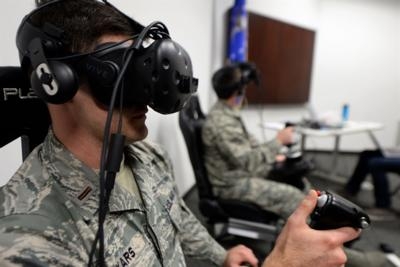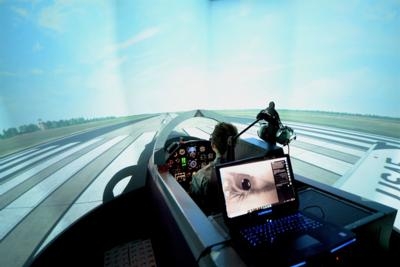Three Test Groups Asked To Fly T-6 Sim With No Previous T-6 Experience
A team of student researchers from Air Command and Staff College, Air University at Maxwell Air Force Base, AL, conducted an Adaptive Flight Training Study Jan. 9-12, 2018, at Columbus AFB, MS, to aid in the Air Force’s advancement in training and education through virtual reality.

The study was held primarily to find out if the VR environment would help adults learn at or above the rates they are currently learning, and how the brain works and reacts in conjunction with other parts of the body during the learning process.
Three test groups were tasked to fly a T-6 Texan II simulator with no prior T-6 flying experience. The groups ranged from experienced pilots who had not flown the T-6; pilots who have limited flying experience and none within the T-6; and the final group had no flying experience whatsoever. “We took the idea of learning through advanced technologies like VR, and came up with our idea of a targeted learning system,” said Maj. Matt Elmore, Air Command and Staff College student. “We are focusing on how our troops learn, using technology to measure the person, the environment and their performance, to see if we can provide better feedback both adaptively in the curriculum and to provide variables or indicators to select people for certain jobs based on the results.”
The three test groups flew four simulations; the first simulated flight set the baseline so the data could be compared to the other three flights. The task was to fly a basic sortie around Columbus AFB and land safely. During the baseline simulation flight, participants were given 10 minutes to read instructions of the pattern they would be flying and how to operate the aircraft. For their virtual training sessions the subjects were given three learning environments, providing less optical and auditory cues as they progressed to help them learn their task.
Following their training sessions the subjects would fly a final flight in the T-6 Texan II flight simulator to determine if there was any improvement through the virtual reality training. “The data we are gathering can hopefully help us start to determine the key factors of what makes individuals succeed or perform better,” Elmore said. “Now this won’t be an end all be all, but it’s good to be on the leading edge of this and start the conversation.”
Because there is a lot of data being gathered, there are multiple groups attached to this project. Only a handful of individuals traveled to Columbus AFB to set up and conduct the study, each of them with a specific skill and portion of the study to control. “There’s a lot of use cases with our technology that the Air Force was trying to do, like being able to actually measure the activity of the brain as a student was learning to fly,” said David Zakariaie, Senseye CEO.

The Senseye team members are primarily setting up the gear, running the VR programs, and collecting the data from where, when and how the subject’s eyes are moving throughout their sorties. “We’re focusing on pilots now, but everything that we are doing here today, could be applied to almost any [Air Force specialty code],” Zakariaie said.
Along with the tracking of eye movement, another set of data that will be collected; the heart and respiratory patterns will be tracked throughout the study to see if any connection can be made to patterns of success or failure during subject’s flights. “We were briefed on the study and learned they wanted to include, in all of this, an element of state assessment,” said Capt. Wesley Baker, Air Force Research Laboratory deputy program manager for cognitive performance optimization. “For the purposes of this study I will be measuring the heart rate and respiration data of 15 individuals as they fly in the simulations.”
The data is specifically being collected from the eyes, heart and lungs to possibly find each individual’s estimated maximum cognitive loads; this is a factor on the success of the research, as the implications of the possible findings could be applied to limitless training environments across the Air Force. “What we want to prove is that a virtual reality environment will help our students learn at a faster rate than the traditional methods, and more effectively,” Elmore said. “The real question is where can’t this kind of learning go? We can drive this training and make it work for us instead of playing catch up and that’s a big takeaway, if we become early adopters.”
(Image provided with USAF news release)
 ANN's Daily Aero-Linx (04.15.24)
ANN's Daily Aero-Linx (04.15.24) Classic Aero-TV: 'No Other Options' -- The Israeli Air Force's Danny Shapira
Classic Aero-TV: 'No Other Options' -- The Israeli Air Force's Danny Shapira Aero-News: Quote of the Day (04.15.24)
Aero-News: Quote of the Day (04.15.24) Airborne 04.16.24: RV Update, Affordable Flying Expo, Diamond Lil
Airborne 04.16.24: RV Update, Affordable Flying Expo, Diamond Lil ANN's Daily Aero-Term (04.16.24): Chart Supplement US
ANN's Daily Aero-Term (04.16.24): Chart Supplement US




